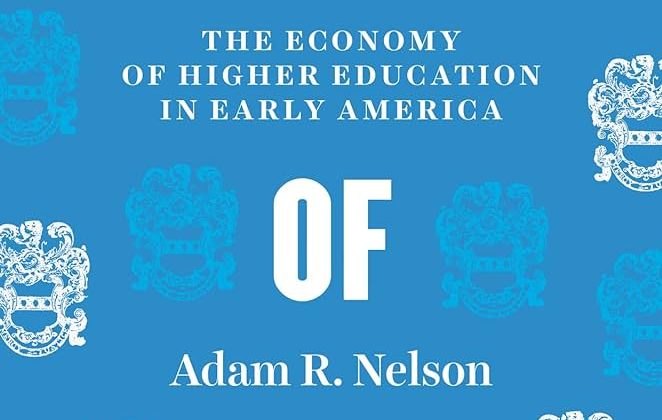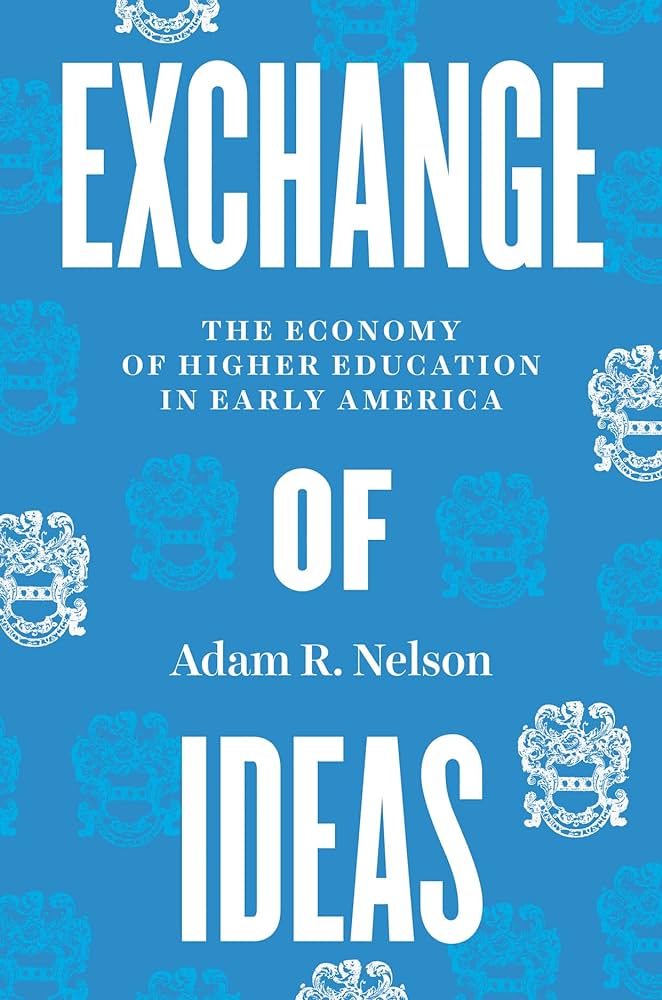

Adam R. Nelson is Vilas Distinguished Achievement Professor of Educational Policy Studies and History at the University of Wisconsin-Madison. This interview is based on his new book, Exchange of Ideas: The Economy of Higher Education in Early America (University of Chicago Press, 2023).
JF: What led you to write Exchange of Ideas?
AN: Debates in American higher education over the past several decades have been driven by three keywords: neoliberalization, globalization, and polarization. These debates and keywords have a longer history than most people realize. I wrote Exchange of Ideas to show how their earlier iterations shaped the very foundations of American higher education. In particular, I set out to explain how a series of shifts in the international political economy of knowledge (basically, the interplay of political interests, economic forces, and education) led to new ways of understanding the relation between colleges and “the public good.” Contrary to conventional wisdom, most college leaders during the late colonial and early national periods sought to maximize public financial support for higher education, in emulation of successful European states. Yet, their primary obstacle after the revolution was partisanship. Unable to overcome this obstacle, they gradually turned away from an economy of knowledge grounded in commonwealth republicanism toward a new market liberalism as the optimal way to organize the United States’ (and, they hoped, the world’s) higher-education system. Thereafter, knowledge became, for some, a neutral commodity, but others anticipated the ways in which a global competition for student consumers would lead to a new commercialization and, eventually, politicization of higher education. Herein lay the roots of today’s debates.
JF: In 2 sentences, what is the argument of Exchange of Ideas?
AN: Exchange of Ideas follows the market revolution of the mid eighteenth century to reveal how a rapid commodification of higher education during the late colonial and early national periods incorporated academic knowledge into the broader sphere of transatlantic commercial relations. Whereas, earlier, scholars might have imagined that higher education could sit beyond the sphere of market activity, that intellectual exchange could transcend vulgar consumerism, that students could seek knowledge “for its own sake,” Americans by the end of the eighteenth century seemed to agree that ideas were commodities, that “useful knowledge” was a “salable good” factored into the nation’s balance of trade, and that it was an essential function of colleges to oversee the complex process whereby knowledge was priced and purchased.
JF: Why do we need to read Exchange of Ideas?
AN: To grasp the challenges that face higher education today, one must take the long view. Yet, in this country, graduate programs in history often neglect the study of education, and graduate programs in education often neglect the study of history—not to mention the study of political economy and the study of international-comparative systems of knowledge production. The result is a strategic lack of higher-education leaders who understand the institutional arrangements that shape the rise and fall of knowledge economies, as well as the ideological forces that shape the wealth of nations over time. Exchange of Ideas offers the historical perspective that higher-education leaders need. It combines the history of education with the “new” history of capitalism to show how Americans in an earlier age confronted the commercialization of knowledge with a mixture of fascination and fear. While many welcomed a liberalization of academic trade and hoped to compete successfully for ideas around the world, others worried that a “laissez-faire” approach to intellectual exchange might devalue scholarship. Yes, they conceded, ideas could become consumer goods, but at what cost? This question, with its various meanings, sits at the heart of today’s higher-education debates, not just in the United States but around the world.
JF: Why and when did you become an American historian?
AN: During my undergraduate years, I often asked myself: how would I know whether I was getting a good education? It took me four years to realize there was no right answer to such a question, but my search prompted a decision to apply to graduate school to explore how people in the past had addressed it. I went to study U.S. intellectual history at Brown, where my advisor, John L. Thomas, supported my plan to combine the history of ideas and history of education, with a focus on what happens to educational ideas as they assume institutional form. All of my books have dealt with this question in some way, even if they have covered different historical periods. But my interest has not been purely academic. Over time, I have taken several opportunities to engage in cross-national deliberations about the comparative structure of higher-education systems as well as the future of global knowledge production, and I have begun to blend my academic pursuits with administrative responsibilities in a large R1 university. In this work, I have become increasingly attuned to all the complex political and financial imperatives that shape how such institutions operate, and I find that it helps to bring historical perspective to bear on both short- and long-term strategic decisions. In my (admittedly biased) opinion, we need more historians in positions of higher-education leadership.
JF: What is your next project?
AN: Well, actually, Exchange of Ideas is the first of three volumes I plan to publish with the University of Chicago Press on early American higher education. The second, titled Capital of Mind: The Idea of a Modern American University, will be released in January 2024, and I am now completing the last volume, called Nation of Knowledge: Internationalism, Imperialism, and the Americanization of Science. It examines how attempts to institutionalize science in the new United States balanced a desire to advance the well-being of humanity with an equally strong desire to advance the specific interests of the national state. Nation of Knowledge is divided into four parts. The first part explains how American science after the revolution cast itself as the idealized expression of republican cosmopolitanism—or a new American universalism. The second part shows how this republican cosmopolitanism took on a new guise as the rhetoric of “internationalism” became a cloak for aggressive western expansion and territorial control, typically led by scientific explorers. The third part demonstrates how scientific republicans abandoned their original conceit of cosmopolitanism as the War of 1812 made science a tool of transatlantic competition and military statecraft. The fourth and final part recounts how a bold scientific imperialism emerged when the United States extended its geopolitical reach across not just the continent but the hemisphere. By the 1830s, the distinction between scientific internationalism and imperialism had dissolved into Ralph Waldo Emerson’s ideal of “The American Scholar,” simultaneously the savior of humanity and servant of the state. In the end, I suggest, as the “republic of letters” and the “empire of science” blended into one, the ideological foundations were laid for a new kind of institution: the modern research university. Perhaps some of your blog followers will read all three of these books!
JF: Thanks, Adam!